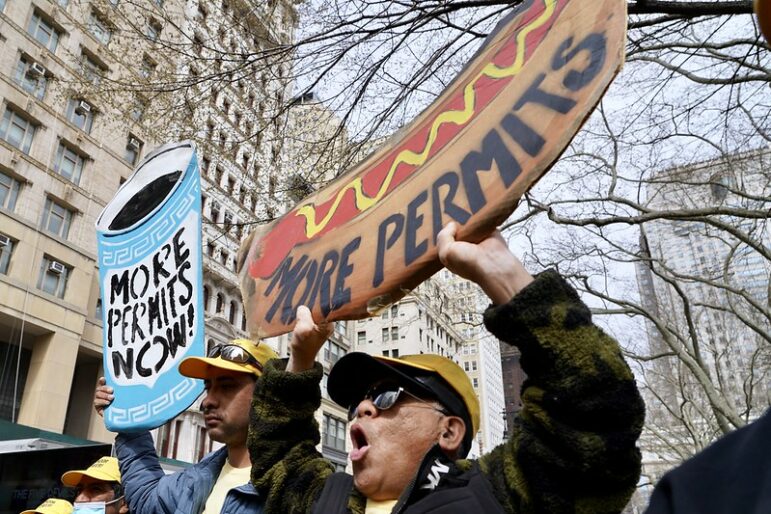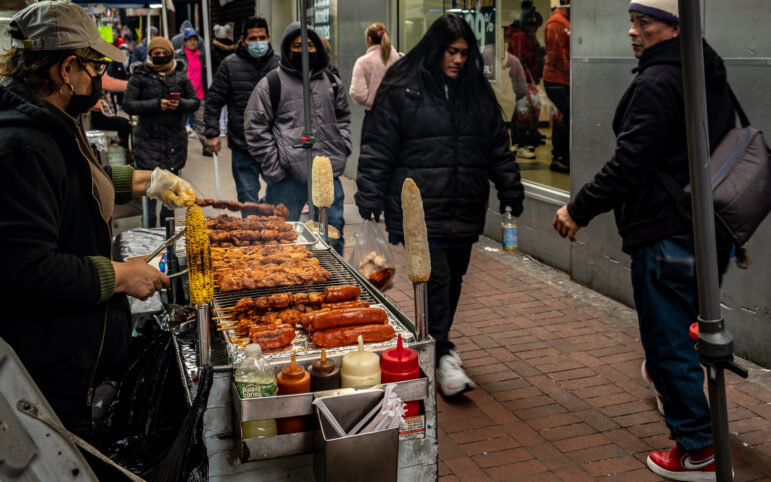The new Vending Bureau at the Sanitation Department will have nearly 40 employees, up from 14 vendors inspectors in the current configuration. Vendors worry the shift could further penalize their sector, which has seen a recent uptick in city-issued violations, as City Limits reported previously.

Gerardo Romo / NYC Council Media Unit
Vendors rallied outside City Hall on Wednesday. The city has for decades capped the number of permits available to mobile vendors, meaning many operate against the rules. The Health Department was supposed to begin issuing the first batch of new licenses this summer, but is behind schedule.Lea la versión en español aquí.
Street vendors and their advocates are criticizing City Hall’s decision to move enforcement from the Department of Consumer and Worker Protection (DCWP) to the Department of Sanitation (DSNY), saying the shift could further penalize vendors, who’ve seen a recent uptick in city-issued violations.
City Council Sanitation Committee Chair Sandy Nurse and Immigration Chair Shahana Hanif immediately reacted to the news with a joint statement questioning why the decision was made without consulting stakeholders, including vendors themselves, many of whom are working-class immigrant New Yorkers. “This work sector deserves policies that recognize its value and accommodate its distinct needs,” the lawmakers said.
The decision is the most recent overhaul in how the city regulates vendors, many of whom operate without proper permits, the number of which has been capped for decades, making them hard to obtain. DCWP was put in charge of vendor enforcement under Mayor Bill de Blasio, though the NYPD issued the majority of vending tickets last year, City Limits’ reporting has found. Vendors and advocates have long pushed for the city to remove police from the process.
“[The city] did not mention any announcement about the NYPD criminalizing vendors,” said Mohamed Attia, managing director at the Street Vendors Project (SVP), an advocacy group for city vendors. This would be a more significant change, he argued, than putting DSNY in charge.
SVP rallied Wednesday afternoon to oppose the change, calling for the measure to be reversed by keeping DCWP as the primary civilian enforcer.
But DCWP Commissioner Vilda Vera Mayuga said she supports the decision, which will take effect April 1. During a City Council hearing Wednesday, Commissioner Mayuga said the agency’s inspectors faced operational challenges in enforcing vending rules, such as not receiving IDs from vendors, and in some cases, faced aggression and violence.
DCWP created its Office of Street Vendor Enforcement (OSVE) as part of the 2018 law passed by the city to lift the current cap on vending permits. The enforcement unit started with eight inspectors in July 2021, and reached capacity with 24 inspectors in October 2021. By the beginning of 2023, there were 14 inspectors.
The Vending Bureau, the new office at DSNY, will have nearly 40 employees.
Sanitation officials have defended the need for more stringent enforcement, calling unregulated vending “among the most visible challenges to cleanliness across the city.” Queens City Councilwoman Sandra Ung recently pushed for increased regulations in her district, pointing to a proliferation of vendors that crowd sidewalks in downtown Flushing. (The two zip codes that encompass Flushing, however, actually saw the most DCWP inspections in the city last year—1,159—more than five times the number of complaints lodged about vendors there during the same period).
DSNY isn’t entirely new to vendor enforcement: In addition to DCWP and NYPD, the city departments of Health, Parks, and Sanitation all also issue tickets to street vendors.
“As Sanitation Police Officers are accustomed to dealing with the intersection of public space, businesses, and communities around cleanliness, the Department of Sanitation will take on enforcement of illegal vending rules,” Department Spokesperson Vincent Gragnani told City Limits.
In both 2022 and 2021, Sanitation issued 14 vending tickets per year, and one so far in 2023. It doled out 31 tickets to vendors in 2018, none in 2019, and just two in 2020.
The 14 food-related and confiscation actions DSNY performed last year were not actually related to street vendors at all, but to brick and mortar stores that were vending on the sidewalk or in no-vending zones, according to Joshua Goodman, the Deputy Commissioner of Public Affairs & Customer Experience at DSNY.
Testifying before the City Council Wednesday, Attia used the enforcement data to bolster his argument against putting the Sanitation Department in charge. “These low numbers talk about how little involvement they have had,” said Attia over the phone.

Adi Talwar
A street vendor on Roosevelt Avenue in Jackson Heights.
As of March 23, there were 14,981 Mobile licensed food vendors in the city, according to the Department of Health and Mental Hygiene (DOHMH), meaning these vendors passed the DOHMH Health Academy food protection course.
| Mobile Food Vending Licenses Approved by DOHMH | |
| Calendar Year | Approved Licenses |
| 2018 | 1,730 |
| 2019 | 1,820 |
| 2020 | 322 |
| 2021 | 652 |
| 2022 | 1,276 |
| Total | 5,800 |
Under city rules, vendors are required to have both a license and a permit from DOHMH, but permits are currently capped at 5,100, leaving almost a third of vendors without one. A black market for permits has thrived for years, in which vendors pay thousands of dollars a year to lease them.
The city was expected to officially lift that cap—as required by the 2018 vendor reform law—beginning last summer, but is several months behind schedule. A DOHMH spokesperson told City Limits the agency will begin issuing applications for the new supervisory licenses by the end of the month.
Sonia Pérez, a 52-year-old tamales vendor in Bushwick is a member of the Street Vendor Advisory Board (SVAB) that Mayor Eric Adams convened last year to weigh in on policies impacting the sector, said she felt slighted by the city’s sudden enforcement change.
“When I learned that the administration made decisions to change the regulatory agency, without consulting anyone on the Advisory Board, my job felt diminished,” Pérez said in Spanish. “Once again, our city rushes to create more enforcement measures for street vendors, but fails to reform the unfair and outdated regulatory system or provide opportunities for smaller businesses in the city to thrive.”
Vendors who testified at Wednesday’s hearing said they’d taken the afternoon off from working to be there. City enforcement has a similar impact on their livelihood, they said, pointing to inspectors who confiscate food carts and other equipment. Fines for unlicensed vending can cost up to $1,000.
“How do we tell our children that this day is not a work day because things have been confiscated?” Pérez said. “Or how do we tell them that there is no money for school?”








